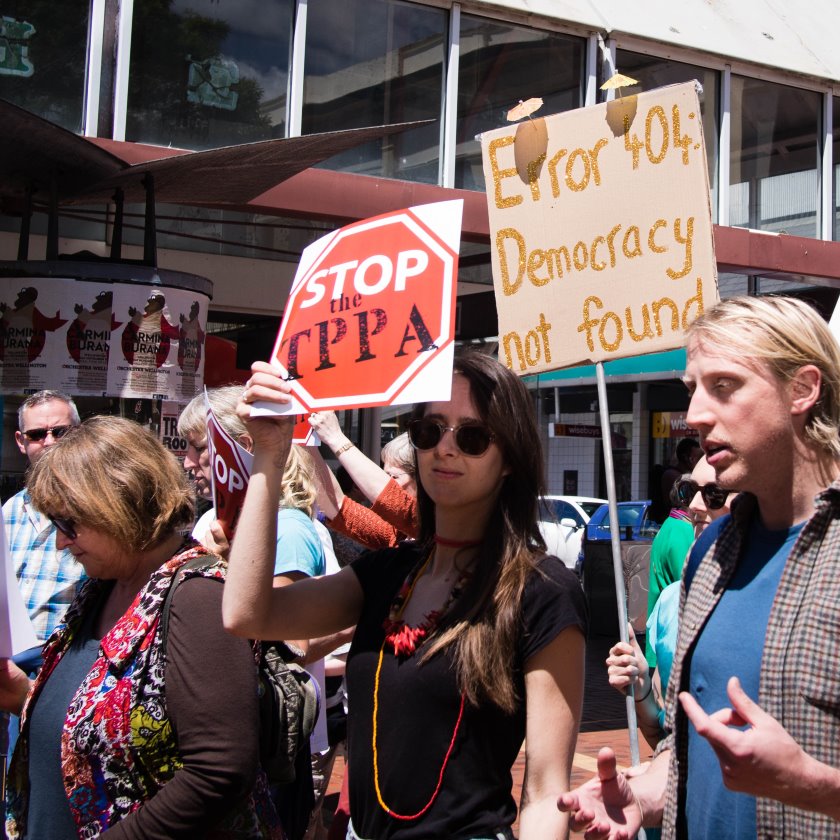Prof Jane Kelsey, in her critique of the still-secret Comprehensive and Progressive Agreement on Trans-Pacific Partnership (formerly the Trans-Pacific Partnership Agreement [TPPA]) notes in The Spinoff:
The most crucial area of the TPPA that has not received enough attention is the novel chapter on electronic commerce—basically, a set of rules that will cement the oligopoly of Big Tech for the indefinite future, allowing them to hold data offshore subject to the privacy and security laws of the country hosting the server, or not to disclose source codes, preventing effective scrutiny of anti-competitive or discriminatory practices. Other rules say offshore service providers don’t need to have a presence inside the country, thus undermining tax, consumer protection and labour laws, and governments can’t require locally established firms to use local content or services.
If this new government is as digitally illiterate as the previous one, then we are in some serious trouble.
I’m all for free trade but not at the expense of my own country’s interests, or at the expense of real competition, and the Green Party’s position (I assume in part operating out of caution due to the opaqueness of the negotiations) is understandable.
Protecting a partly corrupt oligopoly is dangerous territory in a century that will rely more heavily on digital commerce.
While there may be some valid IP reasons to protect source code, these need to be revealed in legal proceedings if it came to that—and one hopes there are provisions for dispute settlement that can lift the veil. But we don’t really know just how revised those dispute settlement procedures are. Let’s hope that Labour’s earlier stated position on this will hold.
Google has already found itself in trouble for anticompetitive and discriminatory practices in Europe, and if observations over the last decade count for anything, it’s that they’ll stop at nothing to try it on. Are we giving them a free ride now?
Despite Prof Kelsey’s concerns, I can accept that parties need not have a presence within a nation or be compelled to use local content or services. But the level of tax avoidance exhibited by Google, Facebook, Apple et al is staggering, and one hopes that our new government won’t bend over quite as easily. (While I realize the US isn’t part of this agreement, remember that big firms have subsidiaries in signatory countries through which they operate, and earlier trade agreements have shown just how they have taken on governments.)
She claims that the technology minister, the Hon Clare Curran, has no information on the ecommerce chapter’s analysis—and if she doesn’t have it, then what are we signing up to?
However, Labour’s inability to be transparent—something they criticized the previous government on—is a weak point after a generally favourable start to 2018. The Leader of the Opposition is right to call the government out on this when his comment was sought: basically, they were tough on us when we were in government, so we hope they’ll live up to their own standards. Right now, it doesn’t look like it. I suspect Kelsey is now the National Party fan’s best friend after being vilified for years. Bit like when Nicky Hager (whom one very respected MP in the last Labour government called a right-wing conspiracy theorist) wrote Seeds of Distrust.
And the solutions that Kelsey proposes are so simple and elegant that it’s daft they weren’t followed, since they are consistent with the Labour brand. I know, trade agreements can stay confidential at this stage and this isn’t unprecedented. But that’s not what Labour said it wanted. At least these suggestions would have shown some consistency with Labour’s previous positions, and given some assurance that it’s in charge.
What should a Labour-led government have done differently? First, it should have commissioned the revised independent economic assessment and health impact analyses it called for in opposition. Second, it should have shown a political backbone, like the Canadian government that also inherited the deal. Canada played hardball and successful demanded side-letters to alter its obligations relating to investment and auto-parts. Not great, but something. New Zealand should have demanded similar side-letters excluding it from ISDS as a pre-requisite for continued participation. Third, it should have sought the suspension of the UPOV 1991 obligation, which has serious Treaty implications, and engaged with Māori to strengthen the Treaty of Waitangi exception, as the Waitangi Tribunal advised. Fourth, it should have withdrawn its agreement to the secrecy pact.
I once joked that National and Labour were basically the same, plus or minus 10 per cent. On days like this, I wonder if I was right.







One thought on “Does TPPA redux protect Big Tech?”